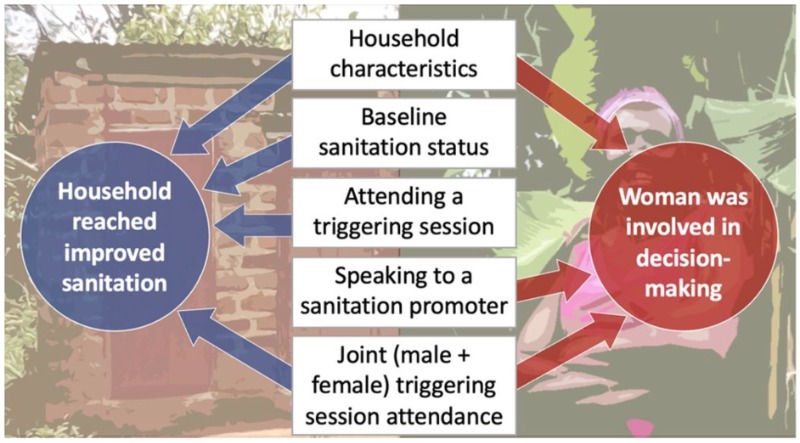- Forum
- categories
- Announcements and miscellaneous
- New publications (books, articles, websites, videos)
- New article on effects of sanitation marketing activities on outcomes & women's decision making
New article on effects of sanitation marketing activities on outcomes & women's decision making
2111 views
- efvicario
-
 Topic Author
Topic Author- PhD Candidate at the University of South Florida. I'm currently researching informal water governance and "pay as you go" systems in Accra, Ghana with a systems-thinking lens.
Less- Posts: 2
- Likes received: 0
Re: New article on effects of sanitation marketing activities on outcomes & women's decision making
Hi Shams,
Thanks for your interest and your kind words!
Unfortunately, I'm not allowed to post the full PDF, but this link should give full access to the first 50 people to use it:
http://pubs.acs.org/articlesonrequest/AOR-SKSJTV2FEXF7KF7YAEEP
Let me know if that doesn't work for you.
Elizabeth
Thanks for your interest and your kind words!
Unfortunately, I'm not allowed to post the full PDF, but this link should give full access to the first 50 people to use it:
http://pubs.acs.org/articlesonrequest/AOR-SKSJTV2FEXF7KF7YAEEP
Let me know if that doesn't work for you.
Elizabeth
Elizabeth Vicario
Dept of Civil and Environmental Engineering
University of South Florida
This email address is being protected from spambots. You need JavaScript enabled to view it.
Dept of Civil and Environmental Engineering
University of South Florida
This email address is being protected from spambots. You need JavaScript enabled to view it.
Please Log in to join the conversation.
You need to login to reply- shamsalibaig
-
- I worked over 6 years as WASH professional with different NGOs in both humanit and normal settings and currently associated with academia as a full time Associate Professor of Environmental Sciences. WASH, water pollution and treatment, resources recovery from wastes, sustainability and climate are the main focus areas of my teaching and research.
Less- Posts: 5
- Likes received: 0
Re: New article on effects of sanitation marketing activities on outcomes & women's decision making
Dear Elizabeth
Great and congratulations for your wonderful accomplishment in prestigious journal. Indeed, it is your great contribution to the field. However, it would be great if you upload the full paper, and most the of group members do not have the access to download from the journal site.
Looking forward
Shams Ali Baig
Great and congratulations for your wonderful accomplishment in prestigious journal. Indeed, it is your great contribution to the field. However, it would be great if you upload the full paper, and most the of group members do not have the access to download from the journal site.
Looking forward
Shams Ali Baig
Dr. Shams Ali Baig
Associate Professor
Department of Environmental Sciences
Abdul Wali Khan University Mardan-Pakistan
E-mail address: shamsalibaig@gmail.com/ This email address is being protected from spambots. You need JavaScript enabled to view it.
scholar.google.com.pk/citations?user=CYT6qfUAAAAJ&hl=en
www.researchgate.net/profile/Shams_Baig
Associate Professor
Department of Environmental Sciences
Abdul Wali Khan University Mardan-Pakistan
E-mail address: shamsalibaig@gmail.com/ This email address is being protected from spambots. You need JavaScript enabled to view it.
scholar.google.com.pk/citations?user=CYT6qfUAAAAJ&hl=en
www.researchgate.net/profile/Shams_Baig
Please Log in to join the conversation.
You need to login to reply- efvicario
-
 Topic Author
Topic Author- PhD Candidate at the University of South Florida. I'm currently researching informal water governance and "pay as you go" systems in Accra, Ghana with a systems-thinking lens.
Less- Posts: 2
- Likes received: 0
New article on effects of sanitation marketing activities on outcomes & women's decision making
Hello all,
I would like to share a new article in Environmental Science & Technology about the effects of sanitation marketing activities on two outcomes: 1) whether a household reached improved sanitation status, and 2) whether a woman was involved in the decision-making process.
Sanitation marketing has been used to improve household sanitation status around the world, but we don't know much about how households react to this type of programming or how household decisions are made.
My co-authors and I identified several variables associated with households reaching improved (basic or limited) sanitation status, as well as whether a woman participated in the household's decision to upgrade their sanitation. We used data from over 86,000 household surveys during a sanitation marketing program in Uganda.
We found that participation in the activities impacted outcomes differently, but joint activity participation (male and female together, usually husband and wife) had a stronger positive impact than male or female participation alone. This was true for both outcomes.
I hope you'll read the full article and reach out with any questions, comments or feedback!
Link to the full article:
Do Sanitation Marketing Activities Increase Households’ Likelihoods of Reaching Improved Sanitation or Involving Women in Decision Making?
Abstract:
Poor sanitation causes 30% of diarrheal deaths globally, and much of the world has struggled to finance top-down interventions. Sanitation marketing is a demand-led approach that uses a mixture of social and commercial marketing methods and direct sales to households. However, little is known about its impacts on household decision making. This mixed-methods study uses data from eight focus groups and 86,666 household surveys from participants in a five-year sanitation marketing program in Uganda. Logistic regression models identified 10 variables predicting attainment of improved (limited or basic) sanitation and four variables predicting female involvement in decision making. Triggering session attendance increased chances of reaching improved sanitation by 15–28%, depending on who attended, and by 19% if the household found the session motivational. Although women were engaged in decision-making conversations, they were not viewed as primary decision makers, even in female-headed households. Women were more likely to become involved in decision making if they had attended triggering sessions with men (+70%) or engaged with sales promoters alone (+74%) or with men (+78%). For both outcomes, joint activity engagement was more effective than male or female engagement alone. This work highlights two sanitation marketing activities as pathways to improving latrine coverage and women’s decision-making agency.
Elizabeth
I would like to share a new article in Environmental Science & Technology about the effects of sanitation marketing activities on two outcomes: 1) whether a household reached improved sanitation status, and 2) whether a woman was involved in the decision-making process.
Sanitation marketing has been used to improve household sanitation status around the world, but we don't know much about how households react to this type of programming or how household decisions are made.
My co-authors and I identified several variables associated with households reaching improved (basic or limited) sanitation status, as well as whether a woman participated in the household's decision to upgrade their sanitation. We used data from over 86,000 household surveys during a sanitation marketing program in Uganda.
We found that participation in the activities impacted outcomes differently, but joint activity participation (male and female together, usually husband and wife) had a stronger positive impact than male or female participation alone. This was true for both outcomes.
I hope you'll read the full article and reach out with any questions, comments or feedback!
Link to the full article:
Do Sanitation Marketing Activities Increase Households’ Likelihoods of Reaching Improved Sanitation or Involving Women in Decision Making?
Abstract:
Poor sanitation causes 30% of diarrheal deaths globally, and much of the world has struggled to finance top-down interventions. Sanitation marketing is a demand-led approach that uses a mixture of social and commercial marketing methods and direct sales to households. However, little is known about its impacts on household decision making. This mixed-methods study uses data from eight focus groups and 86,666 household surveys from participants in a five-year sanitation marketing program in Uganda. Logistic regression models identified 10 variables predicting attainment of improved (limited or basic) sanitation and four variables predicting female involvement in decision making. Triggering session attendance increased chances of reaching improved sanitation by 15–28%, depending on who attended, and by 19% if the household found the session motivational. Although women were engaged in decision-making conversations, they were not viewed as primary decision makers, even in female-headed households. Women were more likely to become involved in decision making if they had attended triggering sessions with men (+70%) or engaged with sales promoters alone (+74%) or with men (+78%). For both outcomes, joint activity engagement was more effective than male or female engagement alone. This work highlights two sanitation marketing activities as pathways to improving latrine coverage and women’s decision-making agency.
Elizabeth
Elizabeth Vicario
Dept of Civil and Environmental Engineering
University of South Florida
This email address is being protected from spambots. You need JavaScript enabled to view it.
Dept of Civil and Environmental Engineering
University of South Florida
This email address is being protected from spambots. You need JavaScript enabled to view it.
Attachments:
-
 TOC.jpg
(Filesize: 99KB)
TOC.jpg
(Filesize: 99KB)
Please Log in to join the conversation.
You need to login to reply
Share this thread:
- Forum
- categories
- Announcements and miscellaneous
- New publications (books, articles, websites, videos)
- New article on effects of sanitation marketing activities on outcomes & women's decision making
Recently active users. Who else has been active?
Time to create page: 0.077 seconds







